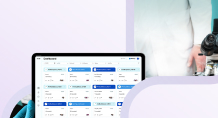Is your brain wired differently? Do you spend 15+ hours per day programming in front of the computer screen, at work, after work, or during your free time, without any breaks, no holidays, no weekends, with no desire to even clean the mountain of paper pizza boxes piled up right next to you, or with no intention to throw away the Coca-Cola cans scattered around the room? But do you do it because you want to and not because someone else asked you to? Well, then, that’s what’s called being a code addict.
The curious case of coding addiction

There are various stage names and definitions that IT experts go by, including coders, programmers, software developers, computer engineers, PC zombies, etc. While for people outside this industry, coding represents an annoying noise and clicking of keyboards, it is precisely those IT professionals who see beyond this rowdy sonata of tags, semicolons, and brackets.
For them, coding isn’t just an account-bank filler, a paycheck provider, a career, a duty, or a matter of professional growth. It isn’t just a hobby, either. It is more than that. Coding is how they live their lives. It is a way of life! It is something existential. Computer programming makes a difference in their happiness.
But above all, coding creates meaning. And that transforms coders into creators of meaning, respectively, who experience a daily enigmatic programming trance in real life. As a software company, we at BGO Software also recognize the reality of programming addiction. Here is a list of 5 reasons we just can’t stop doing it.
Starting from nothing to create something
Programming involves creating something out of nothing. Almost. Of course, you have the base in the form of existing hardware and software. Still, developers begin from scratch. There is the empty text editor, the keyboard, the already learned and practiced commands, an idea to begin with, and a growing desire, a passion, to fill that blankness. So when one starts off, there is practically nothing, but it ends up with a functional program. In the best case scenario. The best and most rewarding part about it? At the end of the day, you live with the conviction that you managed to create something that wasn’t really there before.
Coding is better than Candy Crush
Coding gives a stronger sense of satisfaction than the Candy Crush Saga. Period. It is true that ever since its release back in 2012, Candy Crush has become the king that rules over all other games and has resulted in big profits of billions of dollars and a lot of wasted time. However, think of coding as much better than unlocking levels when trying to crush Candy Crush. As the game progresses, it becomes harder and harder to win, so we start losing more than having good scores. Rather than discouraging the players, coding, in fact, encourages the coders even more. In addition, coding does not put people into “time out” after 5 unsuccessful sequential failures.
Puzzles—who said puzzles?
Everyone has experienced the addictive nature of puzzles. The fascination of getting to solve a complex task. The charm of selecting the right piece and proper move. The joy of knowing that you have put everything the way it should be in order for it to perfectly fit in and grow into a well-constructed final result or a whole new cohesive system.
That’s what it feels like to code. The world of programming is based on the ability to concatenate logical principles, cycles, dynamics, and interactions between different parts, which manage to hypnotize developers subtly and very smoothly.
Many times, it feels a lot like putting similarly-shaped parts together in a logical manner. Programmers, then, are accustomed to dealing with sophisticated structures and dependencies and assembling a predefined set of tools before executing a program successfully. Therefore, coding is very similar to puzzles, and who’s not addicted to puzzles, right? One will never be at risk of running out of challenges that require the best problem solving skills you can muster.
Urge to become better
It is logical to think that if you are addicted to puzzles, then you get addicted to this constant yearning to improve your skills. This makes you strive to either complete the puzzle in a shorter period of time or to do it even better than before by readjusting, reshaping, or rebuilding.
Solving programming problems is very similar. It is truly fascinating how programmers realize they can make software, for example, work more efficiently with every subsequent enhancement. That is something that grows on developers and becomes an inseparable part of coding. Like in any addiction, a person builds up a tolerance for unchanging statuses, so in order to get “hyped”, they need a bigger dose. Here comes the importance of always wanting to advance and go that extra mile in order to achieve more. Only this way will software engineers be able to enrich their pack of skills and crack more complex problems in the future.
Playing God
Programming lets you be the creator of things. It allows you to be God with a sense of control over a situation, activity, or development. And this is yet another reason why people get so hooked on it. This be-like-God feature of coding provides developers with the feeling that they are able to build something meaningful for others. What is more, the thing that is created is seen as a possible world-changer that will transform the lives of end-users entirely. All they need to do is press a button.
In brief, there are plenty of people who choose to go into coding these days. They vary in age and gender, and they come with different imaginary bags full of distinguished interests, reasons, backgrounds, skills, and knowledge. Nowadays, programmers are not just limited to people who received excellent grades in their math and computer science classes. On the contrary.
Programmers are even journalists, writers, painters, undergraduates, musicians, and others. Anyone who believes that programming is yet another form of art that combines the brushes and canvas of technology. Lastly, there are so many tempting reasons to try it. Like expanding your expertise, seeing different horizons, understanding how binary works, learning Java, making websites, playing God, etc. And who knows? You might just get really addicted to it after all.














